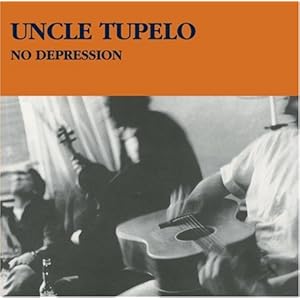Uncle Tupelo – No Depression

No Depression (1990)
B+
1. Graveyard Shift 2. That Year 3. Before I Break 4. No Depression 5. Factory Belt 6. Whiskey Bottle 7. Outdone 8. Train 9. Life Worth Livin’ 10. Flatness 11. So-Called Friend 12. Screen Door 13. John Hardy
I had barely spent a month in utero when No Depression came out, so I haven’t yet been able to figure out whether the term “alt-country” was coined by the “alt” or the “country” side. Sure, this album has, on its surface at least, more Black Flag in it than Hank Williams, but artists are never (or, rarely, at least) the ones to come up with these sorts of arbitrary labels. Genre-specific labels unfairly pigeonhole artists; Jeff Tweedy spent the first part of his career with Wilco deliberately trying (and, eventually, succeeding) to explode his association with alt-country, which, by the time Wilco put out Being There, was bourgeoning into a legitimate, and, as far as fan expectations went, highly conservative, musical movement. Nah, these sorts of labels come from audience—or, more likely, critical—perception. Which is why I’m inclined to think that the phrase “alt-country” originated from country fans. I mean, think about the state of country music in 1990. What was there coming out of Nashville that would satisfy people who loved Hank or Johnny Cash, or followers of Waylon and Willie and all the outlaws in the 70’s? The outlaw country movement that had revitalized country music in the first place during that decade had been all but wiped out and sanitized over the course of the 80’s, ceding prominence to Alan Jackson, Garth Brooks and the beginning of the arenafied, sani-Christian shit that has and continues to drive Nashville to despicable depths of horror. Now, I don’t know how many disaffected country fans had access to No Depression when it came out on the tiny Rockville label in 1990, but I have a feeling that any who did, so long as they were accepting of rock ‘n roll and the punk movement, were probably pretty thrilled. It was a true “alternative” to Nashville’s mainstream dreck – the outlaw spirit of the greatest country music sped up, with loud guitars. Right on.
Besides, sometimes the country and folk leanings aren’t disguised at all. Take Farrar’s waltz-time lament “Whiskey Bottle;” with its sighing pedal steel, and its guitar crunch arriving only on the powerful chorus, it’s as fine a country song as one could ever hope for. “Whiskey bottle over Jesus/Not forever, just for now” is a mighty fine line that Gram Parsons would’ve been proud to have written, but try finding that kind of sentiment coming out of Nashville anytime in the last couple of decades. Or the acoustic title track, a faithfully rendered take on an old Carter Family song, which shows these guys weren’t afraid to fully embrace their less “cool” influences and, in fact, wanted to spread their gospel.
But there’s no doubt that No Depression is primarily driven by energy and electrical geetars. The album was produced by Sean Slade and Paul Q. Kolderie, the team that had produced an apparent Unkie favorite, Dinosaur Jr.’s Bug, in 1988. Surely much to his delight, they gave Farrar access to the same Les Paul that J. Mascis used on that album, and he goes to town with it – Jay’s overdubs constantly burst through the speakers with a meaty, rich tone that gives the band’s attack a real brute force in places. Take the opening collection of heavily, rapidly strummed riffs called “Graveyard Shift.” Played on acoustic guitar, it’s a folk song; here, it’s a really loud folk song played by punk rockers. Same with “Before I Break,” which is really just a three-chord blues (“On liquor I spent my last dime!” Yup, sounds about right for a Delta blues imitation), but those pummeling guitars and time-shifts make it sound quite a bit less familiar than we’re used to.
It’s a great musical recipe, this Minutemen and punk stuff with folk foundations. But the album is perhaps a bit too formula-reliant when compared to their later work. These guys are still newbies, after all, and Jay and Jeff’s songwriting has yet to fully develop. Farrar’s eye for social critique isn’t yet as keen as it would be, so although his voice conveys nothing if not wisdom and profundity, his lyrics at times approach left-leaning folk trope genericism. He issues sweeping, capitalism-weary pronouncements like “A man in a tie will bum your dime before he’ll break his twenty dollar bill” and “Everybody wants what someone else has/There’s sorrow enough for all, just go in any bar and ask.” He makes his point, but he’d get better (then again, maybe writing this straightforward from Jay isn’t such bad thing, seeing as he’d eventually become unrelateably opaque and unclear in his lyricism). On the other hand, Tweedy, lacking the gravitas in his runny-nosed warbling that Farrar has in his delivery, instead opts for character-based underdog sketches about dudes who “sit and watch shit go by.” It’s a perfect dichotomy in approach to capturing “this world of toil and trouble” between Jay and Jeff. Perhaps most of the Tweedy-sung tunes here do feel a bit secondary – after all, Farrar is more fully formed by this point, already approaching his peak at this early stage, and Tweedy is just trying to catch up. And with that in mind, his songs show plenty of promise. That’s excepting “Screen Door,” which is fully realized… a classic, if basic, acoustic skiffley shuffle that was probably Tweedy’s signature song until Wilco got big. His first great song.
Uncle Tupelo would make better albums, but none as influential as No Depression. It practically created a new vocabulary, and without its existence and legacy, I’d be so desperate to hear new stuff that’s nominally roots-based I’d probably be listening to Brad Paisley right now. Praise Jebus I ain’t.

Yaaaaay, good review!